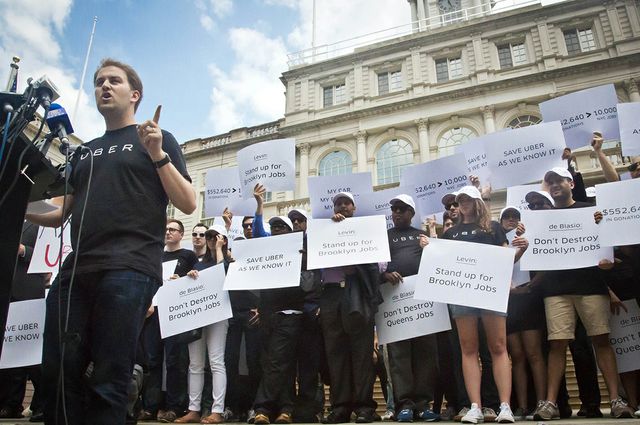Edward T. Walker is an associate professor of sociology in the UCLA College, and the author of “Grassroots for Hire: Public Affairs Consultants in American Democracy.” This op-ed appeared Aug. 6 in the New York Times.
The nasty battle between Uber and the administration of Mayor Bill de Blasio over New York City’s proposed cap on livery vehicles has ended, at least for now, with the city and the ride-hailing giant agreeing to postpone a decision pending a “traffic study.” There’s no doubt who won, though. The mayor underestimated his opponent and was forced to retreat.
It wasn’t just conventional pressure — ads, money, lobbying — that caught the mayor off guard. Uber mobilized its customers, leveraging the power of its app to prompt a populist social-media assault, all in support of a $50 billion corporation. The company added a “de Blasio’s Uber” feature so that every time New Yorkers logged on to order a car, they were reminded of the mayor’s threat (“NO CARS — SEE WHY”) and were sent directly to a petition opposing the new rules. Users were also offered free Uber rides to a June 30 rally at City Hall. Eventually, the mayor and the City Council received 17,000 emails in opposition. Just as Uber has offloaded most costs of operating a taxi onto its drivers, the company uses its customers to do much of its political heavy lifting.
Uber’s earlier strategy to win entry into the Portland, Oregon, market followed a similar pattern. When the city wasn’t allowing the company to operate taxis, Uber exploited rules that allowed it to act as a delivery company, and distributed free ice cream around town. Using data on these deliveries, the firm shrewdly recruited recipients as pro-Uber citizen lobbyists, pressuring local officials to allow their cars to pick up passengers. It worked.
Many tech firms now recognize the organizing power of their user networks, and are weaponizing their apps to achieve political ends. Lyft embedded tools on its site to mobilize users in support of less restrictive regulations. Airbnb provided funding for the “Fair to Share” campaign in the Bay Area, which lobbies to allow short-term housing rentals, and is currently hiring “community organizers” to amplify the voices of home-sharing supporters. Amazon’s “Readers United” was an effort to gain customer backing during its acrimonious dispute with the publisher Hachette. Emails from eBay prodded users to fight online sales-tax legislation.
So it’s reasonable to ask whether there’s still a bright line between being a business and being a campaign organization, or between consumer and activist. Tech companies’ customers may think they are being served. But they are often the ones providing the service.
To be sure, in the clash with Mr. de Blasio, Uber also deployed traditional public relations tools: TV ads, robocalls, mass mailings, celebrity endorsements and political operatives like David Plouffe, the former Obama strategist who now sits on Uber’s board and serves as a “strategic adviser.” Recent estimates indicate that even without counting its army of municipal strategists, Uber now retains over a third more state lobbyists than Walmart.
But traditional methods will get you only so far in today’s political-advocacy environment. Hence the new preference for what I call “grass-roots for hire,” where companies and interest groups galvanize their own users as unpaid campaigners, all with the tap of an app.
These practices are redefining what it means to take part in politics. Social-media platforms were briefly perceived as democratizing tools, engendering transparency and empowerment in the digital age. But these new protest-on-demand movements blur the distinction between genuine citizen organizing and what often is called “astroturf”: participation that looks grass roots but actually isn’t, because it’s been orchestrated to benefit a well-heeled patron.
This Uberization of activism allows corporate sponsors to call the tune: Consider how for-profit colleges leaned on vulnerable students for political pressure, how Comcast enlisted its philanthropic beneficiaries to support the Time Warner merger or the way that the beverage industry hired protesters to oppose soda taxes.
Technology may be neutral, but grass roots should mean bottom up, not top down. The #blacklivesmatter movement is a genuine grass-roots civil rights campaign, mobilized through social media. So is the environmentalist Bill McKibben’s 350.org, with its blend of online organizing, social media strategy and in-person campaigning around climate change. But Uber’s corporate populism is not. We should learn to recognize the difference.





